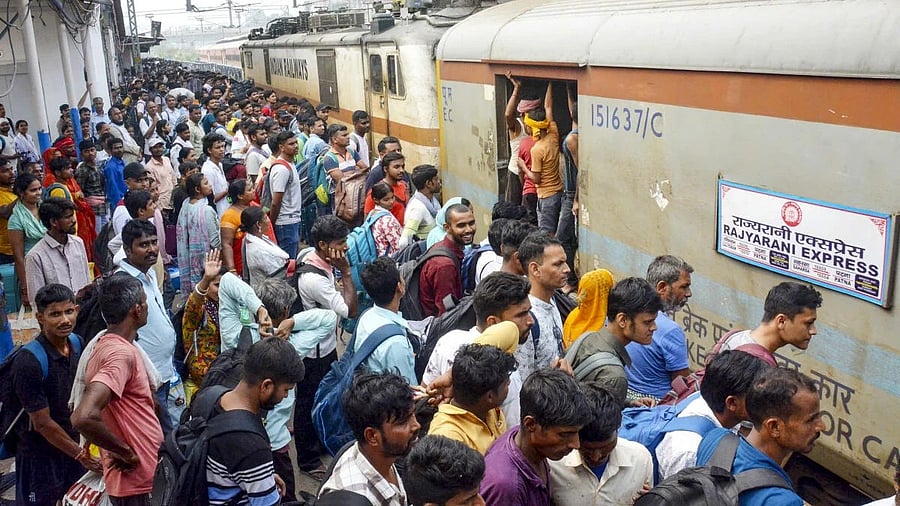
Passengers throng a platform amid heavy rush ahead of the Chhath Puja, at Patna Junction railway station in Bihar.
Credit: PTI File Photo
This year, the homecoming of Bihar’s migrant workers coincides with the election season. Loudspeakers play campaign songs alongside traditional Chhath melodies, while posters of political parties flutter near bamboo pandals prepared for the puja. Faith and politics, migration and memory, have converged into one charged moment. Suddenly, Bihar’s most familiar story — migration — has also become its most political one.
Migration meets mobilisation
For the first time, migration has moved from drawing-room discussions to the campaign trail. Parties are promising jobs, skill centres, and local industries, while rallies recall the anguish of the workers who walked hundreds of kilometres back home during the Covid-19 pandemic.
The timing is symbolic. Chhath draws millions of Biharis home, creating one of the largest seasonal movements in India. This year, the festival has turned into an unplanned but significant moment of political mobilisation. For many returnees, casting their vote has become part of the homecoming ritual alongside offering prayers or mending homes.
Migration defines Bihar’s social and economic identity. According to scholars Gaurav Datt, Swati Dutta, and Sunil Kumar Mishra, “more than half of rural households had at least one migrant worker prior to the pandemic, and for 94% of these households, their migrant workers’ livelihood was adversely affected.” Another striking finding from their study notes that “migrant labour is the main income source for 50 per cent of rural households in Bihar”. In other words, nearly two-thirds of families in the State have someone earning outside.
These remittances form the backbone of Bihar’s rural economy. They sustain consumption, finance education, and keep construction and local trade alive. Yet, until recently, the migrant’s voice seldom shaped the State’s political narrative.
Migration: Burden or backbone?
Migration in Bihar has always carried a paradox. It signals economic distress but also enables survival. The outflow began decades ago, rooted in the State’s inability to industrialise after the 1950s. The creation of Jharkhand in 2000 further deprived Bihar of its mineral-rich belt, leaving agriculture as its primary employer.
With more than 1,100 people per square kilometre (Census 2011), villages are overcrowded and opportunities scarce. Migration became less of a choice and more of a compulsion. The remittances migrants send home are vital; they pay for new homes, weddings, education, and daily needs. Across Siwan, Madhubani, and Purnea, gleaming concrete houses built with migrant earnings stand as symbols of both progress and absence.
As Alakh N Sharma, director of the Institute for Human Development, explains to these authors, “Bihar has to be seen in a wider framework. It’s like two sides of the same coin. On one side, there is unemployment and distress, and on the other, migration sustains countless households. The paradox is real and so is the dependence.”
The migrant’s eye
Those returning for Chhath are not just nostalgic visitors. Having lived and worked in more developed states, they now bring sharper political judgment. Their comparisons are concrete: the stability of electricity, the quality of roads, the cleanliness of public spaces, and access to health and education. They have seen the functioning of other State governments, and now question why Bihar still struggles with the basics.
In tea stalls and chaupals, these conversations are reshaping electoral awareness. Returnees discuss wage security, local governance, and jobs. The migrant worker, once seen merely as a seasonal labourer, has become an agent of political comparison. Their experiences have turned migration from a private struggle into a public demand for accountability.
The pandemic’s reckoning
The Covid-19 lockdown turned migration into India’s most visible crisis. Millions of Bihari labourers, stranded without work or wages, began walking home. Datt, Dutta, and Mishra suggest that 56 pre cent of migrant labourers returned to their native villages, many spending four to five months at home before finding work again. The average fall in remittances was more than 50 per cent, leaving rural families reeling.
The return journeys were often long and painful. The median cost of the return trip was Rs 3,000, and about 10 per cent had unpaid wage arrears averaging Rs 7,000 when they left. These figures underline the deep precarity of Bihar’s migrant workforce.
When these workers returned, they brought not just hardship but hard questions about the absence of social protection, local jobs, and governance. The pandemic transformed migration from a social condition into a political question. As they return for Chhath, the memories of that upheaval remain fresh, and the issue has resurfaced at the centre of Bihar’s electoral discourse.
A turning point
Migration has long been Bihar’s open secret — acknowledged, accepted, yet rarely addressed. This election marks a turning point. Parties can no longer treat migration as peripheral; it has entered the mainstream of campaign promises and public expectations.
Whichever party wins, the message is unambiguous: Bihar cannot continue exporting its youth indefinitely. Migration must now inform the core of policy thinking, from industrial development to social welfare.
Whichever party forms the government, it will have to prioritise the concerns of migrant workers and address the twin challenges of employment and development. In the coming five years, this must remain at the heart of Bihar’s reconstruction agenda.
Sanjay Kumar is founder, Deshkal Society, and co-editor, Interrogating Developments: Insights from the Margins. Shruti is a doctoral scholar and independent researcher. X: @Deshkal_Society, @nishishruti.
(Disclaimer: The views expressed above are the author's own. They do not necessarily reflect the views of DH.)